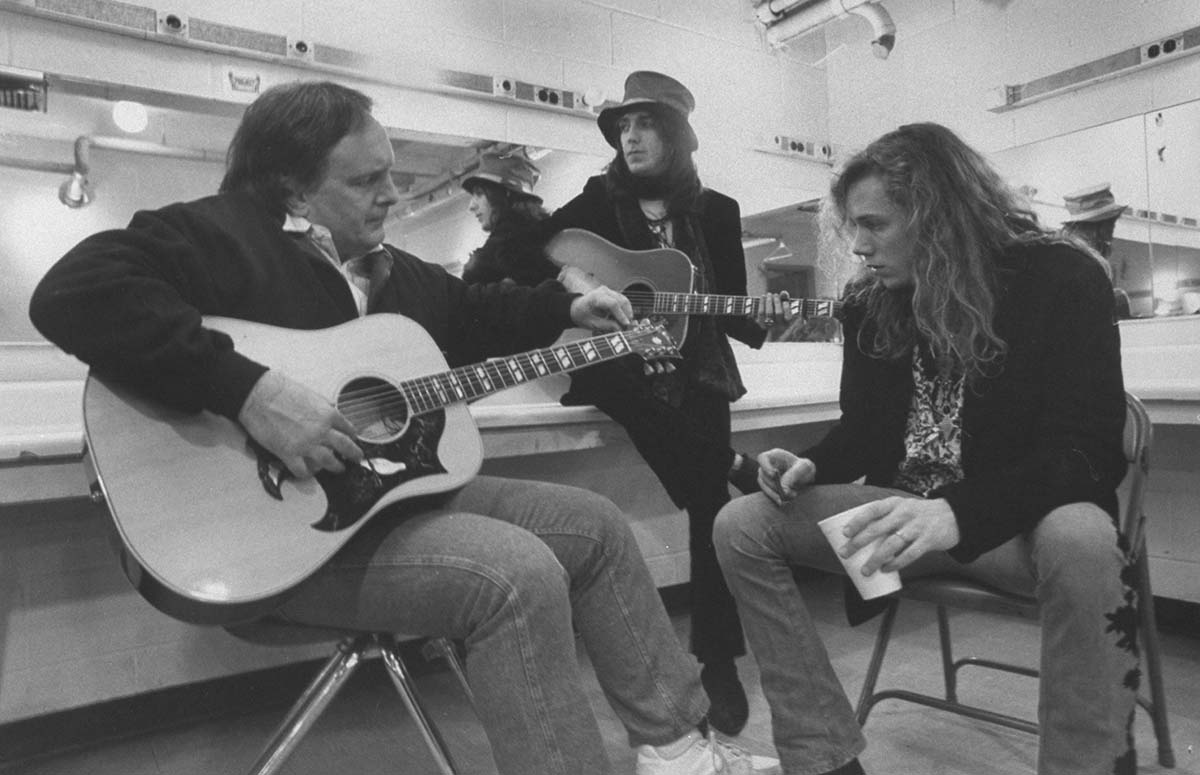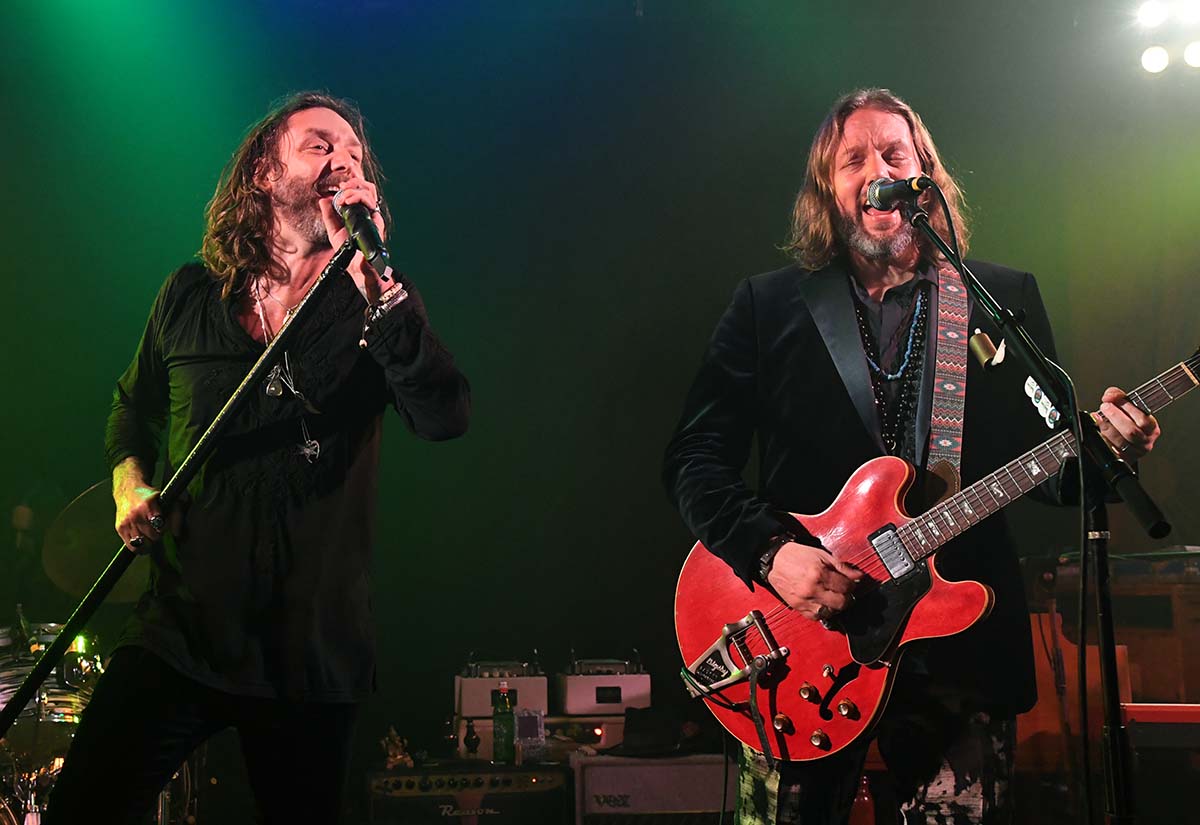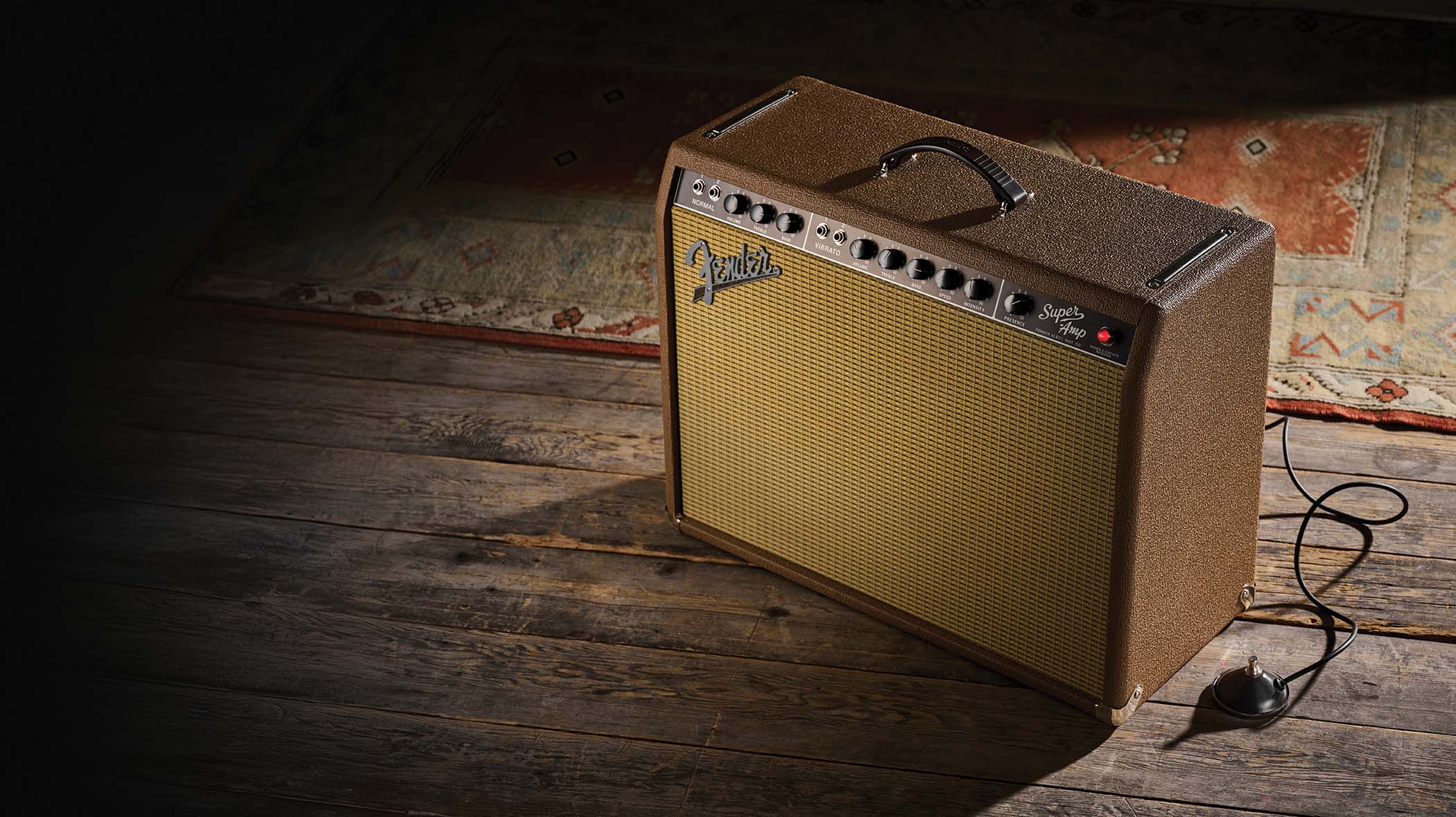The Black Crowes’ Chris and Rich Robinson unpack the story behind their timeless debut, Shake Your Money Maker
How the brothers' combustible creative kinship spawned a rock 'n' roll guitar classic

Rewind to February 1990. With the grunge cavalry still a distant rumble, it is a godless age of choking hairspray, tiger-stripe Kramers and gratuitous go-faster solos. And with an almost perverse sense of timing, it is now that the universe chooses to push The Black Crowes into contention with debut album, Shake Your Money Maker.
In thrall to The Stones, clutching scuffed Teles and beat-up Goldtops, vocalist Chris Robinson and kid brother/guitarist Rich’s unapologetically retro brand of rock ’n’ roll is widely tipped for oblivion. If the prevailing music scene doesn’t kill them then the Robinsons – hotheaded Southerners who proudly tell the rock press that “we knuckle” – will surely do the job themselves.
And yet, here we are, three decades later. The Robinsons are bona fide rock stars. Shake Your Money Maker is a five-million-selling classic, sufficiently iconic to be given a new Super Deluxe reissue treatment. Most unlikely of all, the brothers who once ran the Gallaghers close for sibling rivalry are back on civil terms. “It’s funny,” agrees Chris. “For me, the unimaginable part is to be sitting around talking about this record 30 years later…”
How were The Black Crowes doing when you first started recording Shake Your Money Maker back in 1989?
Chris Robinson: “You mean, anonymity and abject poverty? That was pretty much the vibe. Life is very different when no one gives a shit. Shake Your Money Maker [SYMM] was the first time we put something together that people would listen to. Up until that point, we were like, ‘Please, someone come to this fucking show!’
“You used to tell someone you were in a band and they’d look at you like you were an idiot. Y’know, you’re a loser, you’re never gonna make it, that’s just for Los Angeles and New York. So there was a lot of ‘no’ and ‘can’t’ and ‘won’t’. It was good, though, because we had to rise up past that with our belief in what we were doing.”
Rich Robinson: “We had toured around in the South in vans, played to no-one, had club owners write us bad cheques, had fights – the typical shit bands have to deal with. With SYMM, we were making the best record we knew how to make, but it was a rock ’n’ roll record and rock ’n’ roll wasn’t very popular at the time – it was all Mariah Carey and hair-metal.”
All the latest guitar news, interviews, lessons, reviews, deals and more, direct to your inbox!

Thirty-one years later, how do you think the album has aged?
Chris: “A lot of people bagged us. Y’know, a lot of older journalists and the fuckin’ NME said we were not cool. We were like Neil on The Young Ones… In the 90s, the 70s weren’t cool, y’know? And we took a lot of shit for it. But when I look back, there were a lot of throwaway, dumb, cheesy rock ballads at the time.
“I like a lot of 90s music, but some of it you’re like, ‘Wow, that sounds really 90s.’ And you can say whatever you want, but I think our record is more timeless, without sounding too [conceited]. I don’t think it’s the best record ever made or anything, but there’s a timeless quality to it.”
Rich: “I hadn’t listened to SYMM in decades. I just didn’t do it, until we started getting it remastered. It was interesting to hear, y’know? I think it really holds up. It’s an exciting record and there’s a lot of youthful exuberance on there.”
What was the atmosphere like in the studio?
Chris: “We were still pretty punk-rock and street-oriented at that point. We didn’t do any drugs then – we didn’t have any money. It was all about the record. You were making records in the old way, too, man. Like, there’s no Pro Tools. We played Twice As Hard 30 times to get it right.”
Rich: “We didn’t have hundreds of shows under our belts and we hated rehearsals, so we had to play these songs over and over again. But we took it very seriously and we trusted George Drakoulias [producer]. But we were just kids – I was 19 – so we did some stupid shit, too. I’m sure there was a little bit of vandalism.
You were making records in the old way... Like, there’s no Pro Tools. We played Twice As Hard 30 times to get it right
Chris Robinson
“The opening car wreck to Thick N’ Thin: we actually recorded that. Our drummer, Steve Gorman, had an old Dodge car and there was a gigantic industrial rubbish bin, so our engineer held a mic over this trash can and Steve just kept running into it over and over again.”
Chris: “At that time, Rich and I weren’t really clashing. Later, we would clash over sessions. But it was George’s world. I mean, we wrote the songs and did the performances, but when George said, ‘That’s it’ – that was it.”

When you listen back to SYMM, what do you think of your guitar playing?
Rich: “I’d only been playing since I’d gotten a guitar for Christmas when I was 14 because my dad didn’t want me messing around with his guitar. Chris got a bass. My dad showed me three chords, which was all he had the patience for. He said, ‘Here’s G, C and D, you figure the rest out.’”
Chris: “When we were in [Black Crowes precursor] Mr Crowe’s Garden, Rich wasn’t the flashy guitar player that played solos and stuff…”
Rich: “On SYMM, it was only a couple of years since I’d delved into open tunings. So I wasn’t a master, by any means. I also wasn’t the type of person to practise a ton and obsess. I always believed in letting it happen naturally and focus mainly on writing songs. That’s what Chris and I did from day one. We got guitars, we wrote songs.
“It’s like, you can write a lot of songs with G, C and D. I was obviously into Keith Richards, but Nick Drake really influenced how I played. You see that a little bit in She Talks To Angels. That’s more where I got my open tunings from, him and Stephen Stills. Now, I’m up to about 15 different tunings that I use to write and play songs.”
Chris: “No-one else was really working that hard on their guitars back then. I hear Rich’s playing now and it sounds fucking good. He’s always had an amazing metre.”
Chris, we think of you as a solid player these days. Did you play on SYMM?
Chris: “God, no. I play guitar now in my solo folky, tripped-out world. I’m a rhythm guitarist and I play a little bit of lead – but my leads are like Syd Barrett.”
Rich, what guitars did you use for SYMM?
Rich: “I had my blonde ’68 Tele that I’ve had forever, and my Goldtop that I’ve had forever and had a Bigsby on it. At first, we thought that was a mid-50s model, but later we found out it was a ’68. That Goldtop was really messed up, y’know, the paint had worn off and it had a DiMarzio humbucker and a P-90 in the neck. My dad also loaned me his ’53 Martin D-28 for She Talks To Angels. He later gave it to me and I’ve played that on every record as well.”
Rich had an interesting guitar sound that was different. I mean, before Guns N’ Roses was the biggest thing of all time, you could go buy Les Pauls and they weren’t that expensive
Chris Robinson
Chris: “Rich had an interesting guitar sound that was different. I mean, before Guns N’ Roses was the biggest thing of all time, you could go buy Les Pauls and they weren’t that expensive. When Missing Persons is on MTV, Les Pauls aren’t going for much money, y’know? Les Pauls were Allman Brothers and shit, so you could get these guitars for cheap.
“I think we borrowed a friend’s guitar, too, broke the neck off of it somehow, fucking around, and we didn’t have the money to pay for it. We didn’t have all the shit we’d have two years later. Y’know, when you have money to start procuring good gear.”
Rich: “When I graduated from high school, my parents bought me a Silver Jubilee half-stack and that was it. I didn’t start using pedals until much later, maybe around By Your Side [1999]. So that’s all I had. But that’s kind of how it was. The label didn’t give us an advance. We had zero money. There wasn’t even a food budget. George bought us a sandwich and we had to split it.”
As well as the remastered record and live show, there’s an LP/CD of unreleased songs and B-sides. Which of these bonus tracks should we check out?
Chris: “Things like the She Talks To Angels demo are interesting because you can see the seeds of what would be. I wouldn’t usually listen to any music I made, once it’s done. But when I heard the live show from December 1990, I was like, ‘Wow, that’s a band who just spent a year on the road.’ Every night, we were grinding it out.
“When I listen back to that group of kids… you don’t have to love The Black Crowes, but you can never say we weren’t doing our thing. We were the first band in a long time to play mid-tempo rock. That’s super-70s. Everyone was like, ‘Oh, you don’t do that…’”
I remember the opening night of our tour with Aerosmith – our first arena tour – we opened with this slow, dirgey brand-new song. And no-one was too pleased
Rich: “To hear our covers of 30 Days In The Hole and Jealous Guy again has been great. Charming Mess is cool because it’s an unreleased track, like if someone found a really cool song that came off of Exile On Main St.
“Chris and I were always looking for the next thing, always writing songs, much to the chagrin of our management and label at the time. I remember the opening night of our tour with Aerosmith – our first arena tour – we opened with this slow, dirgey brand-new song. And no-one was too pleased.”
Chris: “When we wrote Charming Mess, we knew the intro was pretty much Hot Legs – and Mr Stewart has given us his approval to put it out. We released that as a single in January, and we had more adds than the Foo Fighters or AC/DC. I was like, ‘Wow, amazing.’ Because the song’s 31 years old.”
Did you have a sense that SYMM was going to sell five million copies? Rich: “Not even remotely. We played to 12 people when we started out, in Salt Lake City, and then we played to 600,000 people in Moscow a year later. Like, how can you quantify that?”
How did you enjoy the fame that was suddenly thrust on you?
Rich: “Chris definitely took the brunt of it – for all of us. It was never something that I really strived for. I’m a much more shy and private person than Chris is. No-one told us how to deal with [the fame]. It was just overnight.
“We put the record out and within a few months we were touring with Aerosmith and Robert Plant, and our record is gold. Within a few more months, it’s platinum. And then, between December and the end of January, we had sold three million albums. It was going that fast. If I remember correctly, Hard To Handle was the most-played video on MTV in America that year.”
I was one behind Liam Gallagher, y’know? Fame and money is boring. David Hasselhoff is famous – who gives a shit? I like being recognised for my music, but I don’t need any other shit
Chris: “The punk-rock streak in me is deep and wide. I always hated the corporate part of it, the record company. I knew we were only as good as the money we made them. Y’know, our next album, [The] Southern Harmony [And Musical Companion, 1992], debuted at No 1, but we only sold a couple of million copies so the label was like, ‘Whatever, they’re kind of over.’
“The fame part… I liked some of it. But the writer in me had always liked the anonymity of my adventures. Y’know, after SYMM, you had a bodyguard just because people are going, ‘Fuck you!’ And back then, I’d be like, ‘Well, fuck you, too!’ I was one behind Liam Gallagher, y’know? Fame and money is boring. David Hasselhoff is famous – who gives a shit? I like being recognised for my music, but I don’t need any other shit. I don’t have a Twitter account. If you need me, come see me, you know what I mean?”
What was your backline when you took SYMM out on the road in the 90s?
Rich: “For all of the Southern Harmony and Shake Your Money Maker tour, I had three Marshall stacks and I think I only used two full stacks, but one was a Silver Jubilee and the other was a Fender Showman running the two cabinets. I wanted to mix the two sounds. And if we played stadiums, like we did with AC/DC – for that Monsters Of Rock stadium tour in 1991 – I think I played all three stacks, which would then be two Silver Jubilees and one stack of Showman.”
When you finally get out on the road this year, how will the live versions of these songs be different to the studio originals?
Chris: “Well, one thing we’ve never done is play the album the way it was. We’ve changed things, we were always problematic. But this time we’ll be playing the album versions, the album lengths. So, for us, it’s kind of a brand-new frontier and I’m excited about that. I’ve been in the wilderness for a while – I’m happy to get back on Broadway.”
I remember walking into the rehearsals on the first day and I’m like, ‘Yes!’ There’s just this avalanche of guitars and I love it
Chris Robinson
Rich: “It’s the little quirks that you do live. It’s like when we played the Zeppelin songs with Jimmy Page. He remembered the live version, the things Zeppelin would do live. So we’d play these songs and Jimmy would be like, ‘No, this was the ending we did.’ I can only imagine that Jimmy was covering three guitar parts and having to work those down into one part. So whenever you tour a song, they’re gonna take lives of their own, however you wanted them to be when you wrote them.”
How did it feel to get back together in 2019?
Chris: “I remember walking into the rehearsals on the first day and I’m like, ‘Yes!’ There’s just this avalanche of guitars and I love it. It’s like, ‘I’ve been in this jam-band world now for 10 years. Just give me a bleeding ear right now.’ It was the thing I needed the most.”
You’re known for butting heads. Has revisiting SYMM brought you closer?
Rich: “Yeah. It kind of brings us back to the beginning and helps me tap into why we started doing this in the first place. Music was always our love and passion – but when it’s mired in pettiness and fighting and bullshit… a lot of times caused by dudes in the band…
“I mean, Steve Gorman told me one time, ‘Man, when you and Chris got along, it scared the shit out of us because we couldn’t get you to do anything we wanted.’ Or however he put it. It was something to that effect. Basically, what he said was that they worked to keep us apart – whereas the band succeeded and made the greatest records when Chris and I worked together. So to dive back into this record, that was really created in a very innocent place, has been really cathartic.”
To dive back into this record, that was really created in a very innocent place, has been really cathartic
Rich Robinson
Chris: “It puts things in perspective. We’ve spent so much time being negative about each other and being surrounded by negative entities that it’s nice to be in a positive place in our 50s. Again, our music is the easy part.
“We never really fought when we were making music. It was all the other shit that’s been a problem. Now we’re in a better place. We can be each other’s brothers and be in a band now. And that’s what it’s about. Before, we were just in a band – but we didn’t behave like brothers, y’know?”
- The Black Crowes' Shake Your Money Maker [Super Deluxe Edition] is out now via American Recordings.
Henry Yates is a freelance journalist who has written about music for titles including The Guardian, Telegraph, NME, Classic Rock, Guitarist, Total Guitar and Metal Hammer. He is the author of Walter Trout's official biography, Rescued From Reality, a talking head on Times Radio and an interviewer who has spoken to Brian May, Jimmy Page, Ozzy Osbourne, Ronnie Wood, Dave Grohl and many more. As a guitarist with three decades' experience, he mostly plays a Fender Telecaster and Gibson Les Paul.

